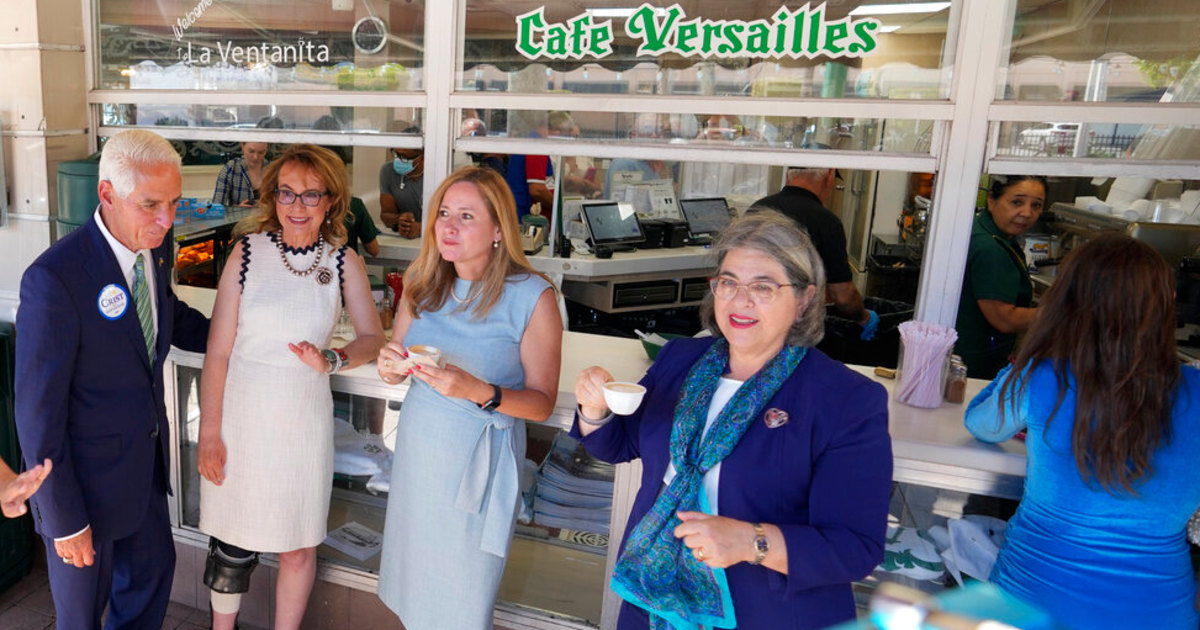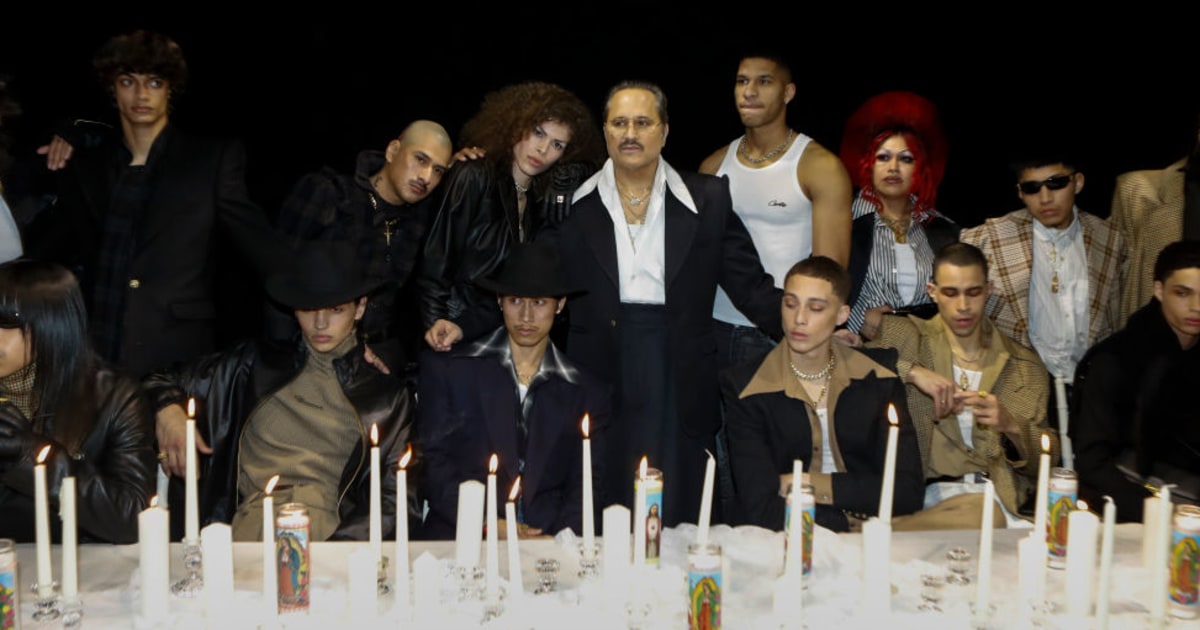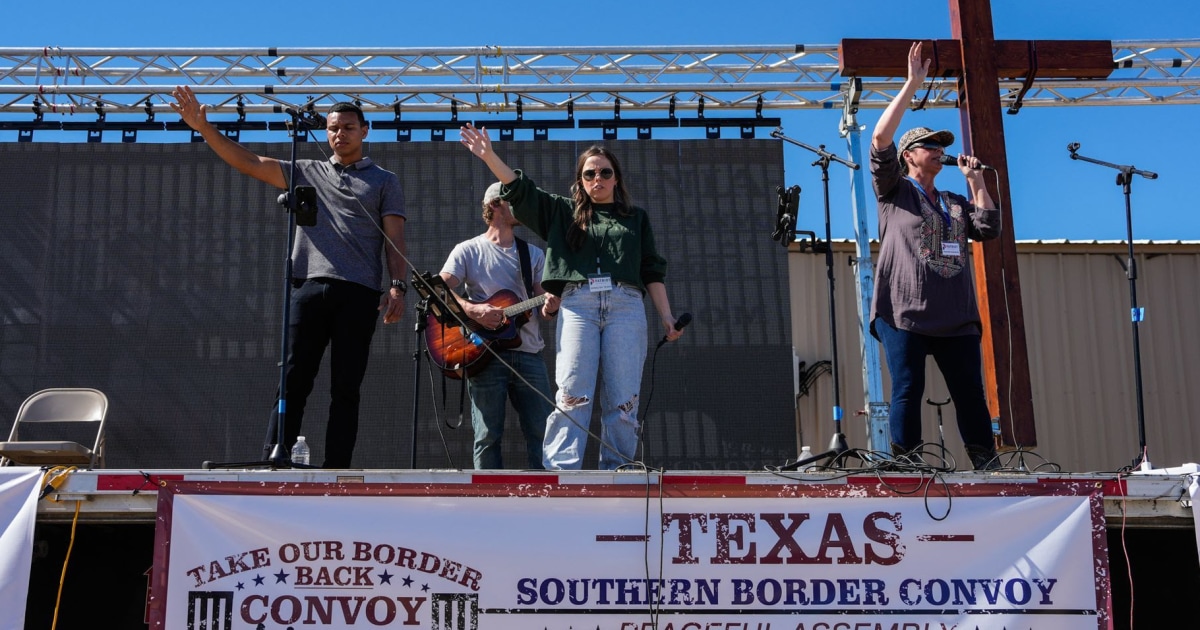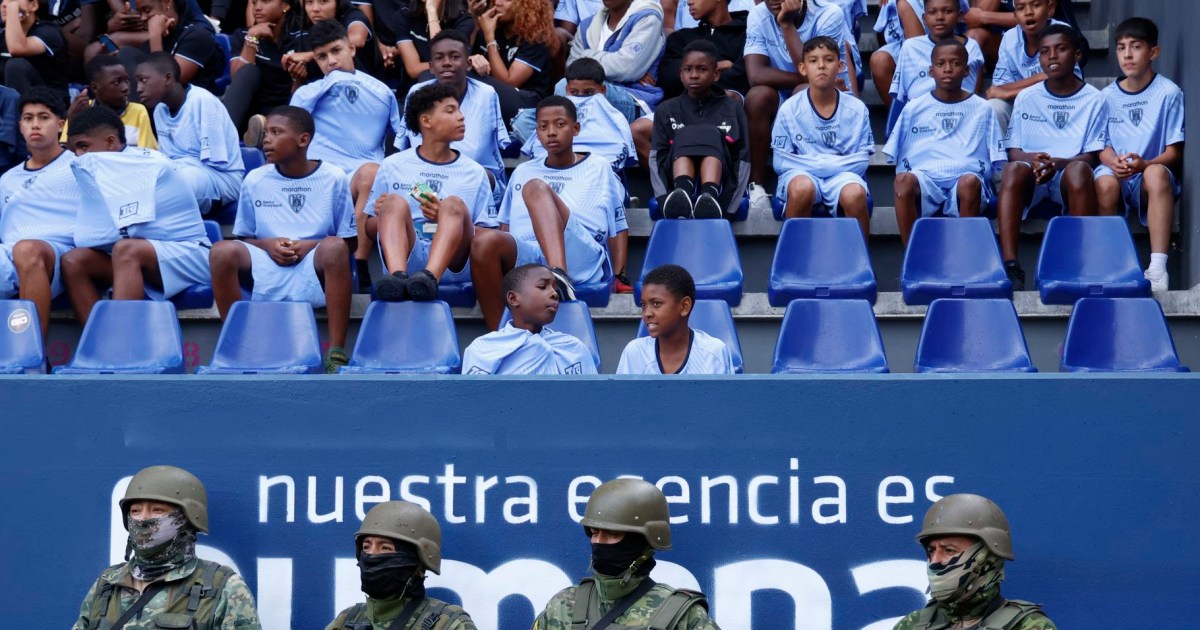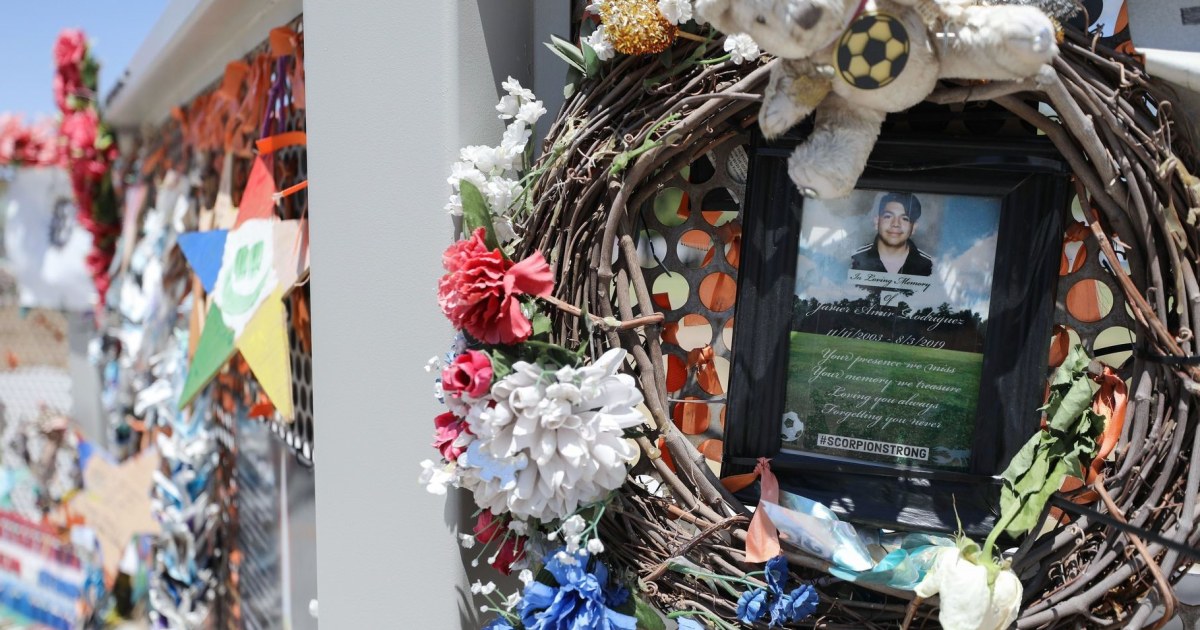By Marina E. Franco and Russell Contreras
Welcome to Axios Latino, a newsletter to tell you every week the stories that have a special impact on the Latino communities in the United States and in Latin America.
If you are interested in subscribing and receiving it in your email, you can do so by clicking here.
Every week we will publish the
newsletter
in Spanish here on Noticias Telemundo for those who prefer it that way.
[
Sign up here to read the newsletter in Spanish
]
LAST MINUTE: The long-awaited Engel list of Northern Triangle officials who will be sanctioned on suspicion of corruption has just been published by the State Department.
And before we begin, we honor Elizabeth "Bertita" Martínez, leader of the Chicano rights movement, who passed away on Tuesday.
1 theme to highlight: The hemispheric impact of the
collapse in Miami
The partial collapse of a 12-story building
in Surfside, Florida, a week ago has caused shock and grief in South America.
Why It Matters:
70% of Miami's population is Latino / Hispanic and the city has been a haven for exiles from many continental troubles.
Among the residents of the Champlain Towers South, which collapsed in the early hours of June 24, were people who fled the regimes in Cuba and Venezuela, others who sought protection against COVID-19 that they could not find at home, and even a person who made Miami the destination of his first plane trip.
More details:
So far 145 people are still missing and the whereabouts of 139 are known. 18 deaths are confirmed, two of them of 4 and 10-year-old girls.
The balance includes:
Hilda Noriega, 92, who fled Cuba in 1960 after the Revolution.
He had been in Champlain for two decades.
Antonio Lozano also fled Cuba and lived on the ninth floor with his wife, Gladys Lozano.
The 83 and 79-year-old couple, respectively, had just celebrated their 59th wedding anniversary.
Puerto Ricans Luis Bermúdez, 26;
Ana Ortiz, her mother, and Frank Kleiman, with whom Ortiz was still on his honeymoon, had been on the seventh floor.
Venezuelans Christina Elvira, 74, and Leon Okiwkowicz, 80, had first immigrated to Chicago and had just moved from there to Florida.
Among the missing are:
Colombians Luis Barth and Catalina Gómez, and their 14-year-old daughter, Valeria, who had gone to Miami to try to get vaccinated against the coronavirus there because they could not do it at home.
Maricoy Obias Bonnefoy, 69, and Claudio Bonnefoy, 85, who is also the uncle of former Chilean President Michelle Bachelet.
Sophia López Moreira, sister of the Paraguayan first lady, her husband Luis Pettengill and their three children, were with Leidy Luna Villalba, 23, who worked as a babysitter for the children.
This was Luna's first trip outside Paraguay.
The tribute to the missing and deceased in Surfside that was erected next to the wreckage of the collapsed building.Giorgio Viera / AFP via Getty Images
It should be noted:
Several problems identified in the building since before the collapse have come to light, such as the fact that in 2018 an engineering report found serious structural damage.
The Florida prosecutor announced that there will be a grand jury investigation and there are already class action lawsuits.
Rescue efforts have been affected over the last week by the weather and the structural instability of the wreckage;
Earlier this Thursday the process had to be temporarily suspended for fear of a collapse.
The latest:
President Joe Biden is in Miami this Thursday with the families and loved ones of the victims.
2. Mexico takes a step towards legal cannabis
Those who promote the decriminalization and legalization of cannabis in Mexico have set up a greenhouse in front of the Senate building in the capital.Héctor Vivas / Getty Images
The Mexican Supreme Court of Justice
ruled this week that it is unconstitutional to prohibit the recreational use of marijuana and THC, as this violates the constitutional right to free development of the personality.
So
: Now it is possible to get a license in the country with which to grow cannabis for personal recreational use.
But the court's decision has limits: there are no rules yet on how many grams or ounces can be carried without being arrested, nor on how to legally obtain the seed or the plant to grow them.
That's up to Congress.
In her own words
: "Right now what is happening is that the criminal organizations involved in illicit drug trafficking are the ones that establish the conditions for how you can access the substance," Frida Ibarra, a lawyer specializing in drug policy, tells Axios. Latino. That exposes people to abuse, extortion, and can only be solved "with a regulation of Congress that establishes who, when and where we will be able to have access" to cannabis, he adds.
The general situation:
Mexico is already close to becoming the largest legal cannabis market in the world, given its population ... but for this, a pending legislative proposal has to be finalized.
Both houses of Congress have voted in favor in the last year, but in each one significant changes were made to the proposed text, so the issue returned to committees, and it will not be until September (or perhaps later) that a text will be voted on. unified.
In short
: Specialists indicate that decriminalization could reduce the violence resulting from cartels fighting over routes to move drugs to the United States, which has claimed the lives of more than 250,000 Mexicans and contributed to the disappearance of more of 80,000 people.
However, the cartels have expanded their portfolios and no longer rely heavily on cannabis;
they currently resort more to fentanyl trafficking and crimes such as extortion, according to the DEA.
3. A chaotic process: family reunifications of separated children at the border
Aïda Amer / Axios
Minors are being dumped
at gas stations, Walmarts and airports with virtually no prior notice to their parents as the Biden Administration's formal process to reunify families separated by Trump Administration policies progresses.
Why it matters:
Families have told Noticias Telemundo that they are sometimes told at dawn where they can pick up their children, and sometimes those addresses are thousands of miles or kilometers away.
As many of the legal guardians are undocumented who are still awaiting their immigration process in court, they do not have driver's licenses or it is difficult for them to get a car to go for the children.
The Biden government paid 112 million dollars to the contractor MVM Inc., which should take the children from centers and shelters in Texas to the cities where their parents are.
The
trauma that minors already have
due to separation is getting worse due to this chaos in reunifications, according to relatives.
Due to depression and post-traumatic stress, there are reports of older children wetting the bed again out of fear or having stopped talking.
In numbers:
36 families have been reunited or are in the process of reunification since February, when Biden established a task force to do so.
An estimated 5,600 minors were separated from their relatives by the zero tolerance policy, and the current Department of Homeland Security estimates that more than 2,000 have not been reunified.
Hundreds of parents were deported without their children.
4. The Amazon, attacks and refugees: a Latin American news account
Planet Earth: Rainforests, vital to the environment, are increasingly threatened
June 22, 202102: 25
Brazil deployed troops to the Amazon
to protect the rainforest just two months after the government of Jair Bolsonaro had withdrawn them.
Why it matters:
Attacks against indigenous groups living in the jungle had been triggered by people who entered after the withdrawal of troops to do illegal mining, logging or ranching.
These people are burning forest to make room for their activities in the protected area and deforestation is at its highest levels in a decade.
Thousands of Venezuelans who had fled
to neighboring countries for years are now heading to the US to seek asylum there, after the pandemic devastated the nations where they had tried to rebuild their lives.
Why it matters:
More than 18,000 Venezuelans were intercepted by US border authorities from January to May of this year, compared to just 1,355 in the same period last year.
The security of Colombian President Iván Duque is being reassessed after the helicopter in which he was traveling was attacked last Friday in Cúcuta, near the border with Venezuela.
Why it matters:
The attack in Cúcuta happened two weeks after the Colombian military base there was attacked with a car bomb.
Meanwhile, the country's security forces are being investigated for their excessive use of force against Colombian protesters.
5. US Latino congressmen ask to turn to the hemisphere
A protest in San José by Nicaraguans who fled to Costa Rica because they reject Daniel Ortega's regime, on April 18, 2021. Ezequiel Becerra / AFP via Getty Images
The arrest of opponents in Nicaragua and the government's response to popular protests in Colombia have also turned US Latino congressmen from both parties to the continent.
Why it matters:
Some senators and representatives are drafting legislative proposals and calling for diplomatic pressure on the Nicaraguan and Colombian regimes after decades of foreign policy focused almost exclusively on the Middle East.
Bottom line:
Lawmakers want the US not to lose sight of the region as China increases its investments there.
6. How poor sleep affects Latinos the most
Megan Robinson / Axios
Suffering from sleep-related problems has
far more severe long-term sequelae among US Latinos than non-Hispanic adults, according to a study that monitored a representative group of people for seven years.
More details:
Items such as verbal memory, concentration, and cognitive processing speed were significantly reduced among Latinos who have sleep problems such as apnea or who consistently sleep more than 9 hours a day.
"We were surprised that the results were stronger in those people who were not obese," one of the researchers, Alberto Ramos, tells Axios Latino, given that among non-Hispanics, metabolic problems such as obesity are greater risk factors for problems. cognitive factors such as dementia or Alzheimer's.
The study notes that more research needs to be done on how to personalize sleep disorder treatments among Latinos to reduce their risks for dementia.
7. Bolivian 'cholitas' defend themselves
These Bolivian indigenous people learn self-defense to face the sexist violence they suffer in their homes
June 28, 202101: 55
The Warmi Power project
is training Bolivian Aymara women, known as cholitas, in self-defense and taekwon-do to defend themselves against abuse and violence at home.
Why it matters
: The project continues with ventures for the empowerment of women, with which they have also managed to have their own wrestling league.
The Bolivian penal code carries a sentence of up to 30 years in prison for femicide, the highest sentence in the judicial system.
However, women say that it does not apply and that is why it is necessary to find other defense mechanisms.
Last year there were 113 femicides, but only 12 of them resulted in sentencing.
Thanks for reading, until next week.
Do you want to read any of the previous editions?
- The bloodshed of civilians
- A heat-battered border thirsts for protection
- Drowning for the American Dream
- The pandemic does not give truce, but football continues
- What worries Hispanics most in the US
- The effects of trying to study when there is COVID-19
- Mexico in mourning;
Colombia and Puerto Rico demand justice
- A controversial count that does not favor Hispanics




